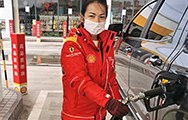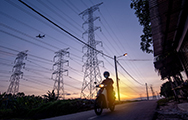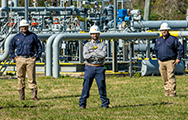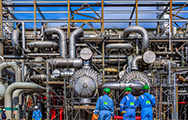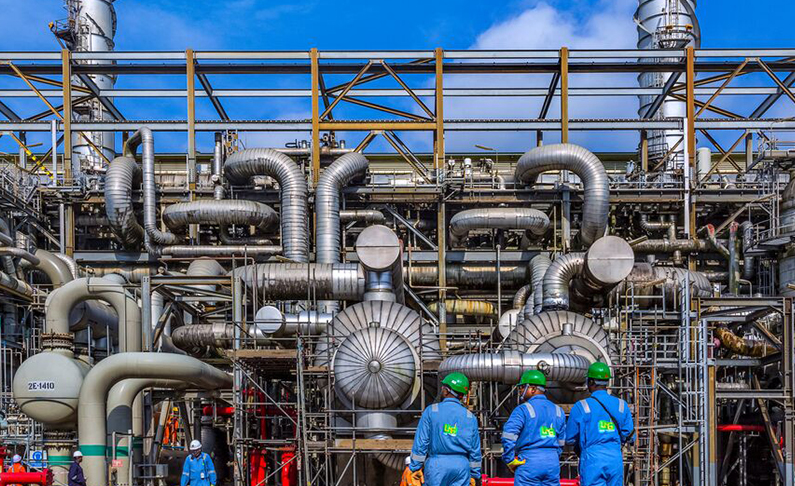Spill response and prevention in Nigeria
Special report
The Shell Petroleum Development Company of Nigeria Ltd (SPDC) produces oil and gas through its SPDC Joint Venture (SPDC-operated, with Shell interest 30%). It operates a network of wells and pipelines across the Niger Delta, a region of forest, farmland, rivers and marshes – the home to around 40 million people.
For decades, the region has been beset by crude oil theft, sabotage of pipelines and illegal oil refining. This results in oil spills, which cause harm to the environment and can damage people’s livelihoods and Shell’s businesses. This illegal activity sometimes occurs in remote areas of the Niger Delta and the SPDC JV can face challenges when it comes to responding to incidents and accessing its infrastructure.
No spill is acceptable, and we work hard to prevent them. Over the last decade, the total number of operational spills in the Niger Delta has fallen significantly, from more than 60 in 2011 to 11 in 2020. The SPDC JV has also made good progress in reducing spills caused by third-party interference and other illegal activities. The combined volume of third-party and operational spills in 2020 was at its lowest level in 10 years. SPDC continues to review its portfolio options for onshore oil in Nigeria. In the last decade, SPDC has reduced its licences in this area by half.
Frequent overflights, on-the-ground inspections and anti-theft protection mechanisms, such as anti-tamper locks and steel cages with CCTV for wellheads, all help discourage crude third-party interference. In addition, closer community relations, the use of new surveillance equipment and improved collaboration with government security agencies have led to quicker, more effective interventions before damage can be done.
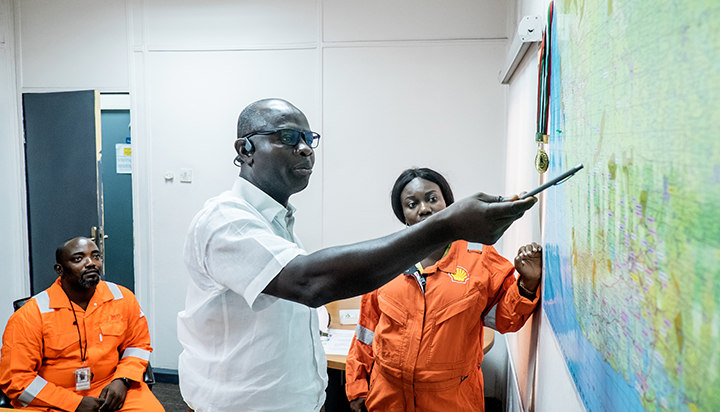
A team in Shell Nigeria hold one of their spill response and remediation review sessions.
SPDC has also implemented several local initiatives and partnerships to address the underlying causes and raise awareness of the damage caused by breaking pipelines and crude oil theft. For example, communities are awarded contracts to monitor the company's pipelines and SPDC promotes alternative livelihoods through entrepreneurship, employment and education programmes.
In 2020, SPDC reduced the volume of operational spills of more than 100 kilograms to about 0.02 thousand tonnes of crude oil (11 incidents) compared with about 0.03 thousand tonnes of crude oil (seven incidents) in 2019. This represents a year-on-year reduction of around a third by weight.
In 2020, more than 90% of oil spills of more than 100 kilograms from the SPDC JV’s facilities were due to third-party interference and other illegal activities. The volume of crude oil spills of more than 100 kilograms caused by sabotage was 1.4 thousand tonnes (122 incidents) in 2020 compared with 2.3 thousand tonnes (156 incidents) in 2019.
Spills in 2020 |
|
|---|---|
Number of operational spills |
11 |
Volume of operational spills |
20 tonnes |
Number of spills caused by third-party interference and other illegal activities |
122 |
Volume of spills caused by third-party interference and other illegal activities |
1,438 tonnes |
Clean-up |
|
Average days before joint investigations commence |
Two days in 2020, improved from six days in 2016 |
Average days to complete the recovery of surface oil |
Five days in 2020, improved from 13 days in 2016 |
Number of sites remediated |
50 in 2020 |
Prevention |
|
Illegal theft points removed |
166 in 2020 |
Steel cages installed to protect wellheads |
364 in total |
Breaches of steel cages in 2020 |
15 out of 1,706 attempts |
SPDC operates to the same technical standards as other Shell companies globally. Illegal activities, including third-party interference, and their legacy continue to require additional work and security but the SPDC JV is able to safely produce oil and gas, limit spills – in number and size – and respond quickly if they do occur.
Regardless of the cause, SPDC cleans up and remediates areas impacted by spills that come from its facilities. In the case of operational spills, SPDC pays compensation to communities affected by the spill. Once the clean-up and remediation are completed, the work is inspected, and, if satisfactory, approved and certified by Nigerian government regulators.
For operational spills, local communities take part in the remediation work and, despite the restrictions of COVID-19, this collaboration continued in 2020, although on a smaller scale. SPDC has collaborated with the International Union for Conservation of Nature (IUCN) since 2012 to enhance remediation techniques and protect biodiversity at sites affected by oil spills.
External voice

Rachel Asante
IUCN
Rachel is a biodiversity expert at the International Union for the Conservation of Nature (IUCN), which brings together government and civil society organisations interested in conserving nature and accelerating the transition to sustainable development.
“A conservation organisation and an oil company are not natural bedfellows. But we have worked together to find some technical solutions to a difficult issue. We’re instituting an advisory group, which is made up of both Nigerian and international scientists, and which is working with the company to ensure that remediation standards are best practice.
“SPDC approached the IUCN about getting some support in areas of remediation and biodiversity recovery. It’s been a fruitful collaboration and we have managed to build trust. We have learned from SPDC and they have learned from us. We've managed to come to a common understanding which is critical.
“We are monitoring the spill sites but we're also monitoring reference sites so that we can establish an environmental baseline. This project can contribute to what needs to be done in the Niger Delta. It’s not a panacea that will solve all the problems of oil spills in the Niger Delta, but I hope it can be part of a larger solution.”
Clean-up in Bodo
In 2015, SPDC and the Bodo community signed a memorandum of understanding granting SPDC access to start cleaning up areas affected by two operational spills in 2008. The clean-up process is overseen by an independent body called the Bodo Mediation Initiative. Two contractors were selected to conduct the clean-up, overseen by an independent project director. The clean-up project initially suffered delays due to difficulties in accessing the sites and disputes between communities.
The first phase, removal of free-phase surface oil, was completed in August 2018 and the contract procurement process for phase two, remediation of soil, was completed in 2019. Remediation activities in the field started in November 2019 and were due to be completed by mid-2021. In 2020, the project was shut down for around seven months due to COVID-19 restrictions. Phase two remediation is now expected to be completed in 2023.
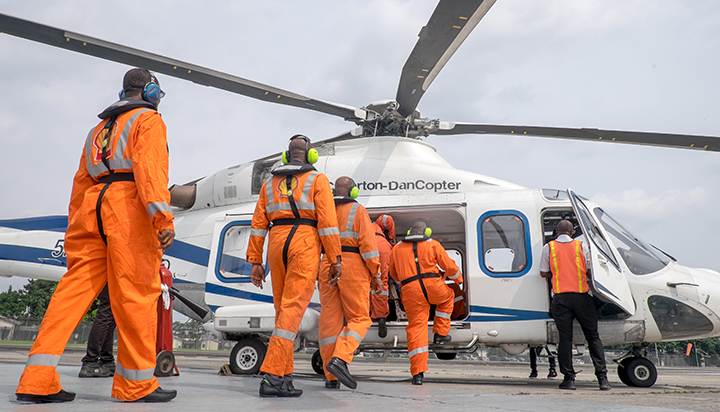
The SPDC remediation and oil spill response team help clean up and remediate areas impacted by spills.
Clean-up in Ogoniland
SPDC is working with the relevant stakeholders to implement the 2011 UN Environmental Programme (UNEP) Report on Ogoniland, where SPDC has not produced oil and gas since 1993. The clean-up efforts are led by the Hydrocarbon Pollution and Remediation Project (HYPREP), an agency established by the Federal Government of Nigeria. For more information on the activities of HYPREP go to hyprep.gov.ng
SPDC has taken action on all of the UNEP recommendations addressed specifically to it as operator of the SPDC JV. SPDC has completed most of these recommended actions.
The UNEP report recommended the creation of an Ogoni Trust Fund with $1 billion capital, to be co-funded by the Nigerian government, the SPDC JV and other operators in the area. The SPDC JV remains fully committed to contributing $900 million to the fund as its share over five years. Since July 2018, the SPDC JV has contributed $360 million.
Nigerian litigation
In March 2021, Shell and four former employees were acquitted in a long-running trial in Milan related to a Nigerian oil block called OPL 245. Shell has always maintained that the 2011 settlement with the Federal Government of Nigeria and Eni that was at the heart of this trial was a legal transaction, so we welcome the ruling. This has been a difficult learning experience for Shell. Business integrity is one of our core values and we continue to work hard to raise standards in this area. You can read Shell's detailed response at www.shell.com/shell-comments-on-the-verdict-from-the-milan-tribunal-over-opl-245
More details on spill prevention and response in Nigeria can be found at www.shell.com.ng/environment and www.shell.com.ng/oil-spills
